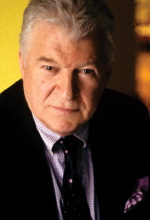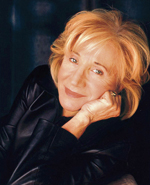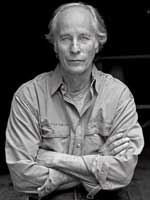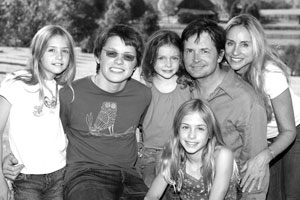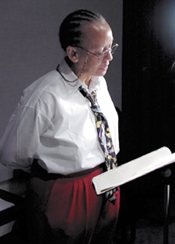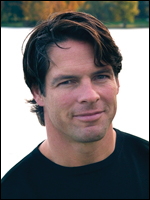Authors From HARPER AUDIO
Elizabeth Acevedo
Last year Elizabeth Acevedo’s novel THE POET X garnered, among other awards, the National Book Award for Young People’s Literature, the Pura Belpré Award for outstanding Latinx literature, and the Printz Award for excellence in young adult literature. The audiobook, narrated by Acevedo, was an Odyssey Honor, an Audie Awards finalist in two categories, and an AudioFile Earphones Award winner. Her newest title, WITH THE FIRE ON HIGH, has already received three starred reviews.
Madeleine Albright
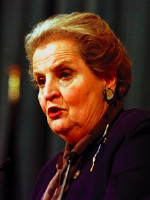
In her new book, THE MIGHTY & THE ALMIGHTY, Madeleine Albright, former Secretary of State and American Ambassador to the United Nations, reflects on the convergence of politics, religion, and morality in the modern world. At a time when differing religious concepts clash throughout the world, she believes we can transform religion into a force for global stability. It’s an important and serious book written by an important and serious woman who knows how to leaven the analysis with humor. Early in the book, she quips that as a woman of Jewish heritage who was raised Catholic and married Episcopalian and who has worked frequently in the Muslim world, she may be uniquely qualified to write about religion in world politics.
Isabel Allende
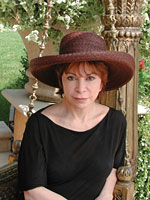
Writing letters provides the source material for many of Isabel Allende’s books. Her first internationally acclaimed bestseller, THE HOUSE OF THE SPIRITS, began as a letter to her 99-year-old grandfather. Her memoir, PAULA, recounting her family’s history, was written as Allende sat at her dying daughter’s bedside. Now, 13 years later, THE SUM OF OUR DAYS is a letter to Paula, updating her on what’s been happening in the family since she’s been gone.
Paul Auster
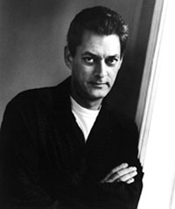
When author Paul Auster asked National Public Radio listeners to submit their personal stories to “Weekend All Things Considered,” he had no idea that he would soon be awash in manuscripts.
Anthony Bourdain
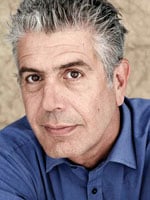
Bestselling memoirist Anthony Bourdain is known for his raspy, confidence-filled voice. In fact, he can’t imagine not recording his work for audiobooks. But what if he could sound like one other person in the world?
Frank Cottrell Boyce

Celebrated children’s author Frank Cottrell Boyce says the idea for his latest book, THE ASTOUNDING BROCCOLI BOY, was staring him right in the face. Literally. “I looked in the mirror one day, and I was bright yellow. I thought, ‘How have I never written about this?’” The author, who suffers from a rare blood disorder, turns a daffodil yellow when stressed. “It’s quite an alarming sci-fi color--not on the normal human spectrum.”
T.C. Boyle

T. Coraghessan Boyle is a serious novelist with a keen sense of the absurd. His short stories appear regularly in The New Yorker , The Atlantic , and Harper’s . Michiko Kakutani of The New York Times praises his “manic gift for language, his love of exaggeration and Grand Guignol effects, his ability to work all sorts of magical variations on literature and history.” Boyle has won prestigious writing awards for his remarkable prose and vision, and of his trademark dark humor he says, “There’s a kind of satiric underlay to it. It’s just the way that I see things.”
Barbara Taylor Bradford

When she had the idea for her first novel, the rags-to-riches story of the indomitable Emma Harte, Barbara Taylor Bradford sat down and wrote a 12-page outline, which she showed to a friend. By chance, he happened to be seeing an American editor who "was looking for a big, old-fashioned family saga." Bradford met with the editors, who said they wanted 200 pages. When she appeared with two shopping bags and 1,592 pages of manuscript, they were overwhelmed. However, she had to wait only two days before they bought the book. After some editing, A Woman of Substance exploded onto the publishing scene in 1979.
Douglas Brinkley

Author Douglas Brinkley believes a work of history should be long enough to tell the complete story. Ironically, it was his experience with the audio abridgment of one of his books that helped shape his writing style from that point on.
Sandra Cisneros
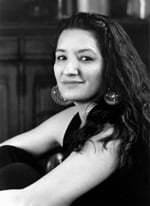
Sandra Cisneros is not only the award-winning author of two novels, countless essays, and poetry, she’s also the narrator of her own work on audio. A devoted audiobook listener, Cisneros prefers hearing authors narrate their own work. “I like to hear the writer. I feel angry when I find the narrator isn’t the person who wrote the work. Even in fiction.” She notes that not all authors will be good narrators, but she still feels strongly that “you find out something about the author just in the way that she expresses herself.”
Bernard Cornwell
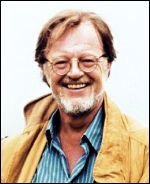
“In the end,” says Bernard Cornwell, “we all write what we like to read.”
Sharon Creech
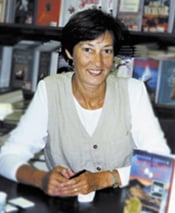
I wanted to be many things when I grew up,” says Sharon Creech Rigg. “A painter, an ice skater, a singer, a reporter. It soon became apparent that I had little drawing talent, very limited tolerance for falling on ice, and absolutely no ability to stay on key while singing. I also learned that I would make a terrible reporter because when I didn’t like the facts, I changed them.”
Alan Cumming
“I’m a storyteller.”
Celebrated actor, novelist, and audiobook narrator Alan Cumming says his job is to take the work of a writer and interpret it for as wide an audience as possible. The same principles apply even if that project involves a memoir--his own memoir, NOT MY FATHER’S SON. “I think there’s an added dimension because each event happened to me, and I’m reading it.”
Pete Dexter
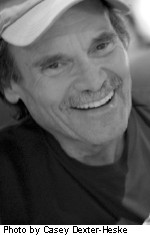
Pete Dexter just can’t help himself. He collects stories, and then he tells them. And if he’s not busy telling one of his own, he’s probably listening to someone else’s, plugged into a book on his iPod during daily workouts or the long road trips he often takes. “Well, I’m not in places where I collect stories so much these days--but once in a while I hear a good one, and it kills me to have no place to tell it.”
Bruce Feiler
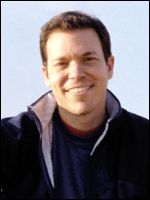
Bruce Feiler likes to immerse himself in his subjects—spending whole years in Japan (LEARNING TO BOW, 1991), at Oxford and Cambridge (LOOKING FOR CLASS, 1993), in the circus (THE BIG TOP, 1995), and on the road with Garth Brooks and Wynonna Judd (DREAMING OUT LOUD, 1998). With his 2001 book, WALKING THE BIBLE, Feiler explored the meaning of Western religion by traveling through the Middle East, using the Pentateuch as his guidebook and identifying the physical locations associated with the Garden of Eden, Noah, Abraham, and Moses by visiting them and walking in biblical characters’ footsteps. The next year he followed up with ABRAHAM, a study of the patriarch from the points of view of Judaism, Christianity, and Islam. Just weeks before the television series based on WALKING THE BIBLE began airing on PBS, AudioFile caught up with the author and world traveler.
Neil Gaiman
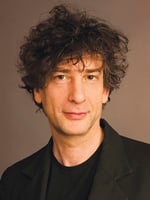
Technically, the first person to hear Neil Gaiman’s new novel, THE OCEAN AT THE END OF THE LANE, was his wife, musician Amanda Palmer. Gaiman handwrote the first draft of the novel while Palmer was far away in Australia.
Elizabeth George
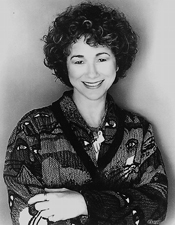
Elizabeth George never listens to her own works on audio. “I imagine very distinct voices for each of my characters,” she says, “especially that of Detective Inspector Thomas Lynley. Except for a brief excerpt by Derek Jacobi, I don’t listen to my audios because I’m concerned that I would lose the voices I carry in my head.”
John Gray
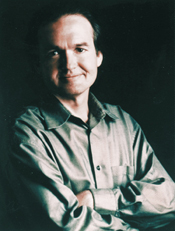
It’s surprising to realize that John Gray’s Mars and Venus books have only been with us for 10 years. It seems like he’s been on the personal development scene forever. He was in Chicago doing media interviews for his new book—Mars and Venus in the Workplace—when AudioFile caught up with him and asked him about his background. “I started out being a teacher, teaching Transcendental Meditation during the heyday of meditation, studying with a maharishi for nine years.” Then he decided to go to graduate school in psychology. It was as a therapist that he developed the relationship concepts he taught in seminars and first wrote about in Men Are from Mars, Women Are from Venus.
Sara Gruen

The animal that Sara Gruen is most associated with is a pachyderm. Next to that might come bonobos. In her most recent book, however, the author of the bestsellers WATER FOR ELEPHANTS and APE HOUSE has placed a mythological creature at the center of her plot. That would be the Loch Ness Monster.
In AT THE WATER’S EDGE, published earlier this year, a Philadelphia socialite named Maddie Hyde accompanies her husband, Ellis, and his best friend to Scotland to search for Nessie (as the monster is often affectionately called) in 1944, as WWII rages around them. The men have been excused from military service for medical reasons, and the trip is intended to vindicate Ellis’s father, who several years earlier was accused of passing off fraudulent photographs of the monster as real ones. The horrors of war, class differences, friendship, and romance are among the issues Maddie faces.
Beth Gutcheon
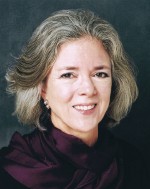
Beth Gutcheon was 10 years old when she heard that the Danish king had worn a yellow armband during WWII to show his support for the Jewish people. It wasn't true. No matter, says Gutcheon. By the time she went to Denmark as an 18-year-old au pair, she knew that the Danes did save their Jewish population and that one day she would write about it. Gutcheon's newest novel, LEEWAY COTTAGE, is that account.
Joe Hill
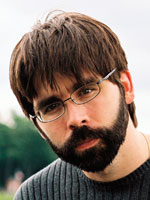
It’s easy to understand why writing comes easily for thriller and horror author Joe Hill--it is, after all, the family business. (Hill is the second child of Stephen and Tabitha King.) Writing was a normal part of life for him, as were audiobooks. Back when the audiobook industry was just gathering steam, before the great availability and variety we enjoy today, the King family would simply make their own. “My whole family loved them,” Hill recalls. “We’d play big, elaborate card games--hearts or poker or whatever--and whoever was the ultimate loser in those games would have to read a book on tape for the winner.”
Tony Hillerman
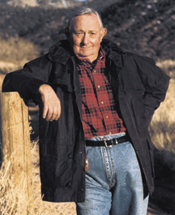
The voice over the phone has a lilt and twinkle to it. “Can you take my Okie accent?” novelist Tony Hillerman asks, chuckling across the miles from his home in Albuquerque, New Mexico, where he and his wife Marie were reveling in what he describes as “the most dazzling, colorful autumn” along the Rio Grande. Hillerman is, of course, the creator of the popular series of contemporary police procedurals rooted in Navajo society, legend, and customs, which features Officers Joe Leaphorn and Jim Chee. Now he is both author of a new memoir, SELDOM DISAPPOINTED and narrator of the 12-hour audiobook version. “The reading experience is just a chore,” he reflects, pulling no punches, which, as the memoir reveals, is clearly his approach to life. “The audio guys make you stop, make you pronounce words the way they’re supposed to be pronounced. They want you to sound like an East Coast Yankee.” Actually, he adds, “It’s easy enough to do. You just sit there and read aloud. But the writing process is a brand new experience each time. Sometimes it’s like pulling teeth and practically impossible. But then you have your real good moments, when you think you’ve done a good job.”
Anthony Horowitz
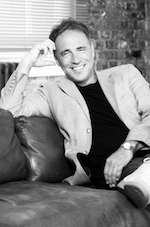
Some days, Anthony Horowitz feels more like a secretary than a writer, which is a tad surprising for the author of 49 novels and many screenplays. He should be the one in charge, yet, “Often I have to write with a pen because I can’t type fast enough to keep up with the speed my characters are talking. It’s as if I’m sitting on the side of the room with a notebook and a pen, furiously scribbling in shorthand the words I’m hearing.”
John Irving
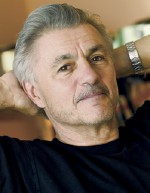
Bestselling, critically acclaimed novelist and Oscar-winning screenwriter John Irving wants his readers to know he values their time and makes sure his novels end with a payoff worth their effort.
J.A. Jance
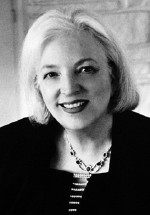
J.A. Jance's firm and resonant voice, combined with her thoughtful way of considering each question before answering, makes interviewing her a pleasure. Along with her many dedicated fans, she is glad to welcome back world-weary J.P. (Jonas Piedmont) Beaumont, a little older, a bit grayer, but still passionately devoted to finding justice--including solving a fifty-year-old murder case. This author, who divides her time between homes in Seattle and Tucson, obviously cares deeply about her fictional characters, as well as her many audio fans. "I think I was born with a storyteller's bone! And I'm not at all sure that it's something that can be taught in creative writing classes--in fact, those classes may actually detract from natural storytelling.
Marilyn Johnson
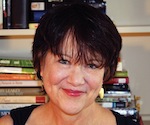
“Really, there’s nothing so fun as being chased down a tropical mountainside by killer bees.” Still revved by the experiences chronicled in her newest book, LIVES IN RUINS, a funny and informative foray into field archaeology, Marilyn Johnson compares the killer bee adventure to being “pursued by the boy you had a crush on at age 6.”
Edward P. Jones
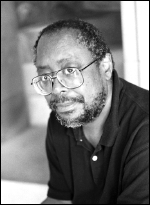
“That 1901 winter, when the wife and her husband were still new to Washington, there came to the wife, like a scent carried on the wind, some word that wolves roamed the streets of the city after sundown . . . ” So begins Edward P. Jones’s new collection of short stories, ALL AUNT HAGAR’S CHILDREN. It is no mistake that that first line evokes the cadence of an oft-told fable. For, while the stories in Jones’s collection are specifically about black people moving from the rural South to Washington, D.C., they explore common and enduring themes of love and longing, kindness and loss, understanding and misunderstanding.
Sebastian Junger

When the audio version of War was being produced, author Sebastian Junger decided to do the reading himself.
Stephen King & Stewart O'Nan
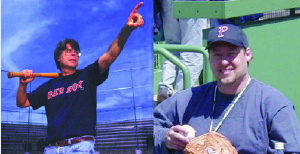
Stephen King’s friendship with Stewart O’Nan was born out of a literary dispute. Nine years ago, O’Nan wanted to title his third novel DEAR STEPHEN KING.
Barbara Kingsolver
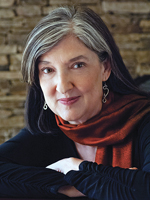
“I love going into the studio to do my audiobooks,” says author Barbara Kingsolver. Her Southern-tinged voice is warm and confiding, and just as appealing on the phone as it is when she’s narrating her books. (She’s read all but one of them herself.) “It’s a little surprising to me how much I love it because I am a really shy person, I’m not a ham, but I really enjoy this one acting gig every couple of years.”
Christina Baker Kline
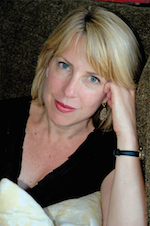
Bestselling author Christina Baker Kline says her new novel, A PIECE OF THE WORLD, about the relationship between the artist Andrew Wyeth and the real-life subject of his iconic painting Christina’s World, was by far the most challenging book she’s ever written.
Dean Koontz
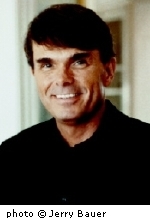
In 1988, when the first of his books was produced on audio, Dean Koontz was appalled. “I allowed an abridged version,” he says, “and the story became incoherent. I never realized that ‘abridged’ meant as much as 60 percent of the story would be cut!” The bestselling author bought back the audio rights to WATCHERS, the second book in the contract, and has insisted on unabridged recordings ever since.
Wally Lamb
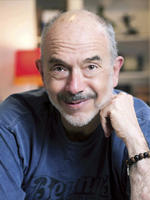
For bestselling novelist Wally Lamb, finding a character’s voice is key to telling his stories. “I was a teacher before I became a writer, and two of the books I would perennially assign were TO KILL A MOCKINGBIRD and THE CATCHER IN THE RYE. Both of those have really distinct voices. I remember reading CATCHER IN THE RYE when I was a teenager and thinking to myself, ‘Oh my God, you can have a real honest-to-goodness authentic speaking voice and use it to tell a novel-length story.’ I thought that was the coolest thing. Year to year, I would teach those novels, and those books taught me how to do it.”
Derek Landy
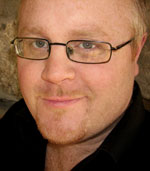
Author Derek Landy has had a stutter since the age of 3, and though it has improved with age, when he was young, he could never voice his wit.
“I was in a lot of situations where I’d be hanging around a lot of people and I would have the best joke in the world in my head, but I wouldn’t get involved in the conversation because I knew I would hesitate or I’d put so much importance and expectation into my remark that I’d wither.”
Mackenzi Lee

Mackenzi Lee has had a long-standing love of audiobooks, since the days she and her sister carried competing boom boxes around the house blasting books on cassettes. So it’s no surprise that she’s the author behind three outstanding audiobook adventures. “So much of my reading as a kid--so much of my foundational experience with books--was through audiobooks,” she says.
Dennis Lehane
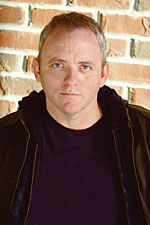
You won’t hear Dennis Lehane, New York Times bestselling author of MYSTIC RIVER; GONE, BABY, GONE; and his new book, THE GIVEN DAY, read any of his novels on audio, but it’s not for the reason you might think. He has a pleasant bass voice and speaks clearly. “It’s too much work,” he explains. “That’s a job. I’ve actually done a little myself, but it was short stories.” He adds, “It’s very much acting. I can read chunks of narrative quite fine, but when I have to do four people talking in a room--you compare my version of that and a professional actor’s version, and you know exactly who’s going to win every time. Why would I want to put an actor out of a job?”
Elmore Leonard
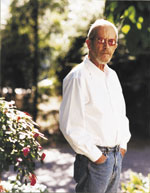
Quintessential crime novelist Elmore Leonard has been clearing the criminal underbrush of Detroit, Michigan—with side junkets to sunnier climes like California and Florida and such foreign venues as Rwanda and Cuba—for more than a generation. Scams and murders have alternated and meshed as tawdry tapestries upon which he’s sprinkled his rowdy band of lowlifes with their deliciously economical chatter. Like the late Ted (Dr. Seuss) Geisel, Leonard began telling tales on the printed page while toiling as an advertising copywriter. "I wrote in my drawer," the writer, 78, says. "I didn’t want to get caught writing something else when I should have been writing Chevrolet ads—which were hard to get into, I’ll tell you."
Jonathan Lethem
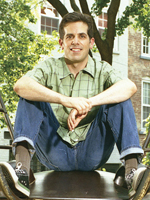
GUN WITH OCCASIONAL MUSIC (1994), Jonathan Lethem’s first novel, was lauded as a visionary work. His fifth novel, Motherless Brooklyn, a detective story featuring a narrator with Tourette’s syndrome, was his first to be adapted for audio, with an unabridged version read by Frank Muller and an abridgment performed by Steve Buscemi. FORTRESS OF SOLITUDE (2003) is an epic tale of race relations, rock music, and two Brooklyn boys with a magical ring. His newest work is a collection of short stories, MEN AND CARTOONS (see review), and in March, Random House Audio will publish a collection of Lethem’s personal essays, THE DISAPPOINTMENT ARTIST.
John Lithgow

Such is John Lithgow’s belief in the power of the spoken word that when his elderly father was ill and in despair, Lithgow offered to read to him. His father chose a story by P.G. Wodehouse, and as Lithgow read, the miracle happened--his father began to laugh. It sounded, writes Lithgow in his new memoir, Drama: An Actor’s Education, “like the engine of an old car, starting up after years of disuse.” To Lithgow’s grateful ears, “It was the most wonderful sound I’d ever heard. And I’m convinced that it was sometime during the telling of that story that my father came back to life
Patricia MacLachlan
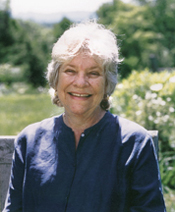
Patricia MacLachlan carries around a sack of prairie dirt with her wherever she goes. “It keeps me centered and reminds me where I began, and why I write,” says MacLachlan, author of SARAH, PLAIN AND TALL, SKYLARK, and her newest sequel, CALEB’S STORY. Glenn Close performs each of the audiobooks in the saga, and MacLachlan couldn’t be more pleased. In fact, MacLachlan will listen to her own books when she has trouble writing. “When I’m stuck,” she says, “I’ll listen to one of my stories and say, ‘That’s the way it’s supposed to go.’ Sometimes I can’t picture Sarah without thinking about Glenn; she brings her life into the performance.”
Debbie Macomber
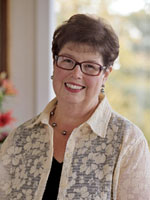
Debbie Macomber has written so many bestselling novels that the list of titles on her Web site scrolls for several pages. The number of audiobooks she’s heard may be almost as long.
Gregory Maguire
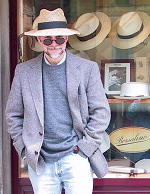
Listening to Gregory Maguire’s recording of LEAPING BEAUTY: AND OTHER ANIMAL TALES, you will meet a gorilla queen, a frog with a promising dance career, and one very bad walrus. You will not, however, hear the story of the very muddy rhinoceros. Maguire may yet write that story—having been inspired in the Harper Audio studio by enunciating into a huge black foam implement [i.e. the microphone] that looks like a used q-tip for a very muddy rhinoceros.
Phillip Margolin
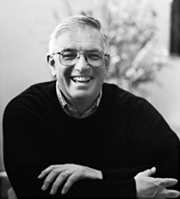
Phillip Margolin brings things to his legal thrillers that few other authors can claim. During his 25 years as a criminal defense attorney, Margolin represented 30 homicide cases, including 12 death penalty cases. His clients included serial killers and heads of drug cartels, as well as battered wives. “So when I’m writing about something to do with law,” he told AUDIOFILE just hours before heading off on a month-long book tour, “it’s probably something that I’ve actually done in real life. I know how people talk, how they walk, what the procedures are, how the judge talks in chambers.”
Armistead Maupin

THE NIGHT LISTENER has just opened in theaters with an all-star cast including Robin Williams and Toni Collette—and includes frequent audiobook narrators Becky Ann Baker, Joe Morton, and Maryanne Plunkett. In 2000, AudioFile talked with author/narrator Armistead Maupin about his new audiobook.
Ed McBain
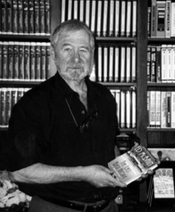
Ed McBain is a man who knows no rest. With more than 80 novels to his name—50 that have been adapted to audio-book—he continues to put in a full day’s work despite having recently completed his latest book, Candyland, co-written with another award-winning author, Evan Hunter. What makes this collaboration unique is that Ed McBain and Evan Hunter are the same person.
Gavin Menzies
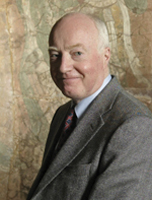
Author and historical researcher Gavin Menzies has never been an audiobook listener. But since he heard his latest book, LOST EMPIRE OF ATLANTIS, he’s become a convert. “Gildart Jackson’s recording is excellent,” he says, “so good that Marcella and I bought a new CD player for our joint Christmas present to be able to fully appreciate the recording.”
Jacquelyn Mitchard
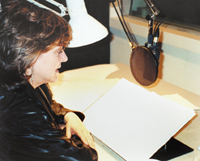
Jacquelyn Mitchard’s third novel was supposed to be a ghost story. “And it was a real good ghost story, too,” she says. But she ultimately abandoned that project when a dramatic legal case in Wisconsin that raised questions about family and family bonds began to haunt her. The new novel, A THEORY OF RELATIVITY, tells the story of 24-year-old Gordon McKenna, who is devastated when his beloved sister and her husband are killed in a car accident, leaving behind a baby girl. In the aftermath, both he and his parents find solace in his decision to adopt the baby. But when the child’s paternal grandparents begin a fight for custody, the ensuing battle reveals that the young man is not considered by state statutes to be a blood relative of the child because he himself had been adopted.
Christopher Moore
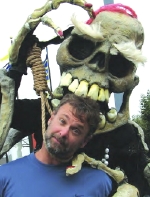
How does a nice boy from Toledo, Ohio, heavily influenced as a sixth grader by the satire in Mad magazine, become a bestselling author living the Northern California and Hawaiian lifestyle and have so much fun doing it? Spend some time talking with Christopher Moore, author of FLUKE, THE STUPIDEST ANGEL, YOU SUCK, and LAMB: THE GOSPEL ACCORDING TO BIFF, CHRIST’S CHILDHOOD PAL (among other provocative titles), and you will soon find that all of this seems to make complete sense in the wildly odd world he inhabits.
Katherine Mosby
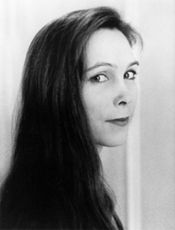
A dedicated poet/novelist, Katherine Mosby, author of the critically acclaimed first novel Private Altars and a book of poetry, The Book of Uncommon Prayer, agonizes over getting the sounds in her writing just right. “The only way that I know how to do it is to read it out loud, to go sentence by sentence and to savor it, to weigh the words and see how they scan and think about the impression they’re making musically.” She admits she might like to read one of her own books for audio since she knows the work best. “I know how to shape the lines as close to the way they were intended as anyone else would.”
Walter Dean Myers
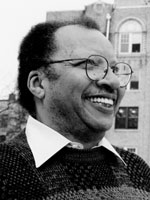
“You have to not love the words.” What a surprising thing for author Walter Dean Myers to say!
Joyce Carol Oates

"Audiobooks are wonderful inventions," says the award-winning author Joyce Carol Oates. "People are often so enthralled by them that they’re disappointed when their trips end. I’ve often sat in our driveway listening to the ending of something—reluctant to break the spell. Obviously, we all love to be told stories, especially by skilled professional storytellers."
Lauren Oliver
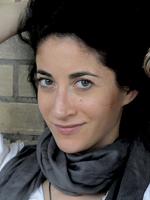
Lauren Oliver has written in different genres and for different age levels. She’s written series and stand-alone books. Her latest projects add to her literary diversity as she’s just finished the first in a realistic teen fiction series called PANIC and is now working on her first adult book. They’ll both come out next year. REQUIEM, the last of her futuristic YA Delirium series and latest publication, is being filmed by Fox for a pilot of the series. She’s published everything but picture books. Oliver laughs at the thought of that one missing format. Actually, she’s co-written one with a friend and is considering what to do with it. “My agent says then I’ll have my readers from cradle to grave.”
Ann Patchett
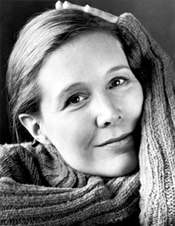
Ann Patchett loves audiobooks. The critically acclaimed novelist credits one of her best friends, A. Manette Ansay (VINEGAR HILL), with getting her interested in them. “When I’m reading,” Patchett says, “my attention span is irregular. Depending on how much pressure I’m under or how tired I am, I’m going to skim. I’m going to read some parts faster than others, but with audiobooks I’m perfectly consistent, and my mind doesn’t wander.”
James Patterson
James Patterson populates his books with terrorists, serial killers, and ruthless criminal masterminds. In contrast to the grisly content of his bestselling novels, Patterson turned out to be a pleasant, easygoing man when AudioFile caught up with him during his four-month, thirty-city tour. “I’m addicted to audiobooks, and every time I get in the car now, that’s all I do. I’m a huge, huge fan,” said Patterson, whose novels top the audiobook sales charts. “It’s a really exciting form. In particular for people who spend a lot of time driving or jogging, it’s the best. I converted about three years ago.” Up until that point, Patterson had led the hectic life of a city dweller. “I had no time. I didn’t want to think about audiobooks. Then I moved to the country. I spend a lot more time in the car. Now every time I get in the car, in goes the audiobook, even if it’s a ten-minute trip.”
Terry Pratchett
We are saddened that Terry Pratchett passed away in March 2015.
Nine-year-old witches with first sight and second thoughts, luggage that travels by itself, and six-foot dwarfs--these are are just a few of the delightful characters that inhabit Terry Pratchett's long-running Discworld series--a wondrous universe that combines the trappings of fantasy (wizards, dragons, elves, etc.) with some of the wittiest, silliest, most penetrating satire being written today.
Jack Prelutsky
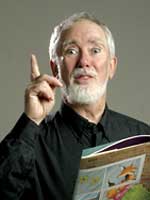
What do you get when you cross an insomniac poet eating a banana at 4 a.m. with a documentary on the Discovery Channel called “Anaconda: Giant Snake of the Amazon”? If you’re Jack Prelutsky, you get a “bananaconda.” Prelutsky, the nation’s first Children’s Poet Laureate and Consultant in Children’s Poetry to the Poetry Foundation, says, “It’s 3 or 4 in the a.m., and I’m bleary-eyed, and it occurs to me that the last three letters of the word ‘banana’ are the same as the first three letters of the word ‘anaconda.’” And from that chance encounter, the book Scranimals was born, featuring such delightful creations as “avocadodos,” “orangatangerines,” “mangorillas,” “porcupineapples,” and “hippopotomushrooms.” And because one book leads to another, in a later volume, BEHOLD THE BOLD UMBRELLAPHANT, he combined animals with objects, resulting in such fanciful beasties as “ballpoint penguins,” “spatuloons,” and “zipperpotamuses.”
Adam Rex

Author-illustrator Adam Rex loves audiobooks and can remember the moment he discovered them: in the summer of 2001, when he and his wife faced a four-and-a-half day drive, moving their possessions from Tucson to Philadelphia. “We loaded up on audiobooks and listened to everything from ONE FLEW OVER THE CUCKOO’S NEST to James Bond novels.” Since then, Rex says, he’s become something of an audiobook connoisseur; particular favorites include the works of David Sedaris, David Rakoff, and Sarah Vowell. Hearing them read, Rex says, “I have the sense that I’ve built a relationship. When I listen, I feel like I’m getting an audio postcard from an old friend.” He’s also a fan of narrators who don’t oversell humor. “They let a funny line be funny on its own merits and don’t read it like they’re playing a slide whistle.”
Gretchen Rubin

Bestselling author and happiness expert Gretchen Rubin’s work focuses on helping people “get the life they want.” Her new work, THE FOUR TENDENCIES, offers vital insights on helping others reach that goal.
Richard Russo
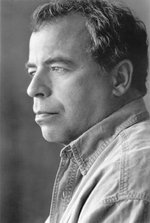
When Richard Russo does a book reading, he holds the crowd in the palm of his hand. The great warmth and humor of his writing come through abundantly, and he is always a hit.
John Sandford
John Sandford defies being pigeonholed or categorized. He’s a man’s man, and his two dozen thrillers are certainly men’s adventures, yet his characters display both sensitivity and sexiness that appeal to female readers. Sandford is a Midwesterner, a longtime resident of Minneapolis/St. Paul. His books are set primarily in Minnesota, with characters who eat, breathe, and sweat the prairie. But his themes and the storytelling with which he reveals them are universal. In 1986 he was awarded the Pulitzer Prize for a newspaper series he wrote about American farm families in crisis. After that, he turned his talents to fiction and has seldom looked back.
Simon Schama
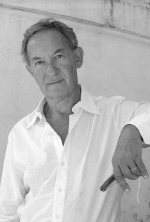
Few Americans know anything of the history of the slaves who joined the Tories during the Revolutionary War. Excluded from the liberty their masters so prized, they fought for England. The English, unlike the Colonists, promised manumission to slaves who would take arms in their cause. A monarchy that offered freedom seems to have been infinitely more attractive than a democracy that did not.
Lisa Scottoline
When bestselling author Lisa Scottoline writes, she surrounds herself with sound. “I have on satellite radio and the Olympics, and dogs are barking in the background. It’s all good for me! At one point, I even had a baby monitor in the chicken coop so I could hear them, too!” Scottoline believes these sounds contribute energy and rhythm to her work. “I like the cacophony. I like voices. They help me think better.” Listening, she believes, helps her tap into what she calls the aural component of writing, helping it “ring true. When the writing rings false,” she explains, “you feel it in your ear.”
Carol Shields
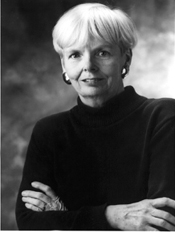
Carol Shields, winner of the Pulitzer Prize and the National Book Critics Circle Award, has narrated all three of her books—THE REPUBLIC OF LOVE, THE STONE DIARIES, and now her newest, LARRY’S PARTY. She always wanted to be an actress. “I always tried out for parts in the school play, but I was too self-conscious, and I didn’t have a loud voice.” When her publisher, Viking, offered the chance to read her works, she thought, “Here’s something I can do!”
Bernie Siegel
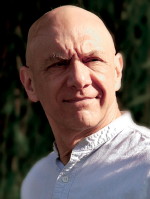
Bernie Siegel, M.D., practiced and taught surgery in Connecticut hospitals for over 30 years before he began writing books and recording audios for people with life-threatening illnesses. It was in the late 1970s that he began doing therapy groups for such patients, teaching them how to discover life and heal old personal wounds that might be making them more vulnerable to illness. “I was considered a total screwball, making people feel guilty if I asked them questions about their lives like ‘Why are you sick now?’ I’d get ‘Oh, you’re telling me it’s my fault?’”
Karin Slaughter

Mystery writer Karin Slaughter, whose latest is BEYOND REACH, wanted her Grant County series to have a Southern narrator who didn’t sound like a hillbilly. “Joyce Bean’s narration,” she says, “is close to the voices that I heard in my head. She does well with the subtleties of colloquialisms and accents. And she doesn’t make anyone sound like they’re from a trailer park.”
Lemony Snicket
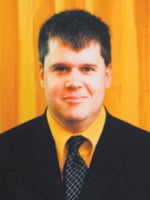
Daniel Handler, a pleasant fellow from San Francisco, bears an uncanny resemblance to Lemony Snicket, mysterious author of bestselling children’s books. Handler even narrated Snicket’s fifth book, THE AUSTERE ACADEMY , an experience that left him reeling.
Jerry Spinelli

“Maybe I’m not your ideal AudioFile subject,’’ says Newbery-winning children’s author Jerry Spinelli. “I don’t listen to many audiobooks. A little William Faulkner. A little Dylan Thomas. To me, audiobooks seem to be an in-car thing, and the stop-and-go driving I do around Willistown, Pennsylvania, doesn’t lend itself to ready listening.” Spinelli only has to commute as far as the office in his own home. Longer trips are usually devoted to plot discussions with his wife and fellow children’s author, Eileen.
Donna Tartt
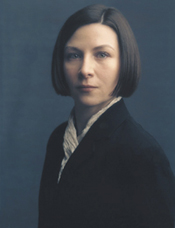
The formal portrait-like photograph on the jacket of Donna Tartt’s books belies the warm, friendly tone that caThe formal portrait-like photograph on the jacket of Donna Tartt’s books belies the warm, friendly tone that came through in her recent telephone interview with AUDIOFILE. Tartt had recently completed the narration of both of her books, THE SECRET HISTORY, an international bestseller when it came out in 1992 and now on audio for the first time, and THE LITTLE FRIEND, her eagerly anticipated second novel. She wanted to narrate her own works, she said, because reading aloud is “very present” in her writing process. “I’m one of those writers who talks to myself constantly while working. Quite often I have to say a passage out loud in order to get the sound just right.”
Charles Todd
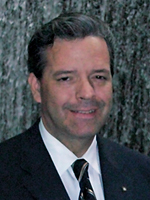
Sixteen years ago, not long after returning from a trip to England, Charles Todd, a native of Virginia, and his North Carolina-born mother, Caroline, set out together to write a book. They didn’t follow any rule book for collaboration. They aren’t the typical writing team. Rugged and wry-mouthed Charles is no momma’s boy by anyone’s definition. Neither is Caroline an overbearing mother. When they finished writing A TEST OF WILLS (1996), they had no idea whether anyone would read their book. Eighteen novels later, writing under the name “Charles Todd,” the pair has garnered multiple awards, several New York Times Notable Books inclusions, and other accolades.
John Updike
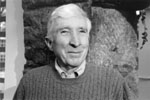
It's surprising to hear John Updike refer to himself as a "self-employed writer." The term seems too precarious, too edgy to apply to the American literary giant who first broke into print in the country's premier literary magazine, THE NEW YORKER, in 1954 at the age of 22 and who has over the last 50 years produced 54 volumes of stories, novels, poems, and criticism, winning virtually every top American literary award. His new collection, EARLY STORIES, gathers the stories written between his first publication and 1975, just over 100. The audio version features 14 of the most well-known early stories, read by Updike himself, Edward Herrmann, and Jane Alexander.
Of the audio production, the author says, "I'm very pleased they were able to get actors of such distinction. Herrmann has a lovely, easy voice, a good baritone. Jane Alexander has a kind of assertiveness in her voice; she takes command of the sentences." When asked about his own narration, he comments, "It's hard to reconstruct the voice that goes on in your head. 'Snowing in Greenwich Village' was a kind of a blow to have to record--I hadn't planned to--and there you have two women talking, so you're trying to pick your way between not only a male and a female voice but two female voices."
In his introduction, which Updike reads himself on the audiobook, he states that when writing these stories, he saw himself as "being in the business of delivering revelatory human news." Despite the difficulties of living that they portray, the stories are punctuated with joy, an upbeat postwar optimism. "Rapture is what you feel at moments, a sense of the world being so wonderful. I think of Wordsworth's words--'trailing clouds of glory do We come'--to describe that feeling of plain, unearned, undeserved happiness that comes upon my heroes: 'It's a miracle for the world to exist and for me to be alive in it.' The only thing tragic about this kind of joy is that it's going to end. For me, death is sort of the end of the party instead of the release that it is for many people."
Married and a father at a young age, Updike gave himself five years to break into writing. His fallback, he thinks, would have been journalism. But with his early success, his sustained renown, and his many accolades, one could say that Updike has made both the process and profession of writing look easy. In hindsight, he says, "It seems a little easier than it was at the time. Each inspiration--each day's work--has its challenge. In order to write, you've got to get up to 'a certain level.' You have to get into it." These days Updike writes at home, "upstairs in what used to be the maids' rooms." He works in three-hour sessions, for the most part, early in the day--"an hour to get into it, an hour when I'm really creative, and an hour trying to wind down.
"These are not very long workdays. But put them end to end, and it does add up. I've tried to apply myself conscientiously to the profession of writing. Most people get up earlier and work much longer days. There are many nice freedoms that a self-employed writer has, and I've tried to earn those by keeping at it."--Elizabeth K. Dodge
Photo by Martha Updike
February/March 2004
Marianne Williamson
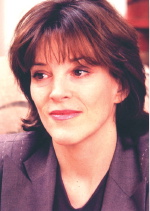
It would be hard to find a more prominent teacher of the Course in Miracles than Marianne Williamson. She first heard the course—a grassroots nondenominational guide to spiritual psychotherapy—in Los Angeles in the late 1970s. As a student of philosophy, she was looking for something she didn’t find in any of the jobs and careers she’d tried. "I did things in my 20s that a lot of young people did who were looking for themselves. I really didn’t get focused until I heard the Course in Miracles."
Simon Winchester
![Simon Winchester [photo by Setsuko Winchester]](/content/uploaded/images/authors/simon-winchester-by-setsuko winchester-150x150.jpg)
Winchester’s book, THE PROFESSOR AND THE MADMAN, concerns one of the great intellectual milestones of recent times, the creation of the Oxford English Dictionary. For those of you who have never heard of the OED, it’s a twelve-volume* lexicon composed on historic principles, carefully tracing the origin and evolution of English words and phrases and giving copious examples. It appeared in 1928 after 70 years of work, almost instantly becoming the ultimate reference on the English language. It still enjoys that status today.
Stuart Woods

With twenty published novels, and more than thirty audiobooks, few writers are as well rep-resented in the audiobook world as Stuart Woods. Half-a-dozen Woods audio-books are slated for pub-lication in 2000, including his latest novel, THE RUN (in abridged and unabridged formats from Harper Audio), and an unabridged reading of his 1981 novel Chiefs (Recorded Books).
Jacqueline Woodson
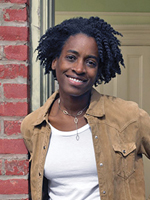
Jacqueline Woodson was a storyteller even as a child--although when she was younger, she says, these stories weren’t the “once-upon-a-time kind,” but more outright lies, tall tales she told to see just how much she could get away with. “It wasn’t malicious,” she laughs. “I just loved to engage people with stories from a young age, and I didn’t know how else to do it.”
The latest audiobook reviews, right in your inbox.
Get our FREE Newsletter and discover a world of audiobooks.

AudioFile Newsletter
Let us recommend your next great audiobook!
No algorithms here!
We pick great audiobooks for you.
Sign up for our free newsletter with audiobook love from AudioFile editors.
If you are already with us, thank you! Just click X above.



